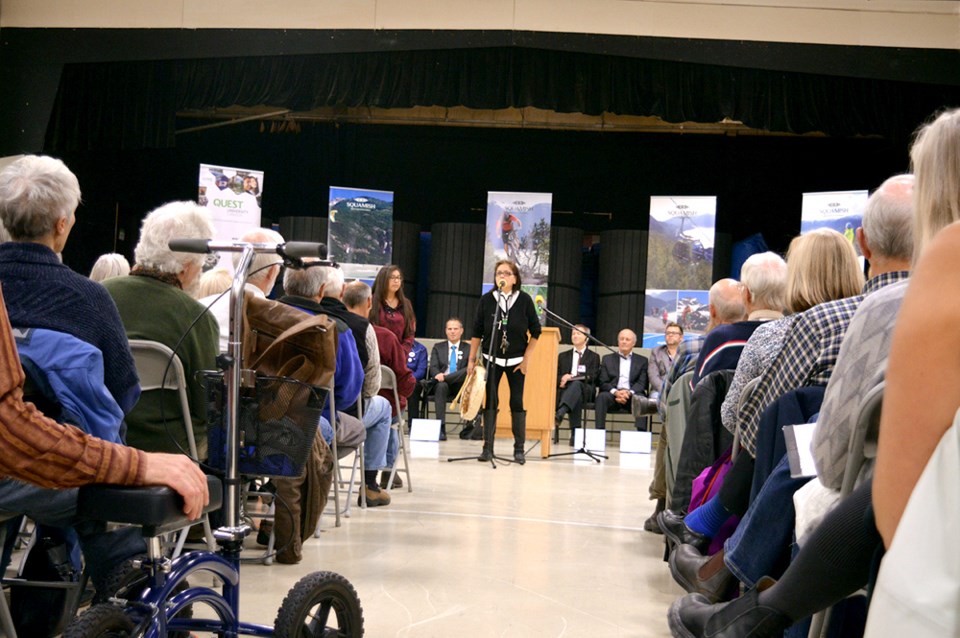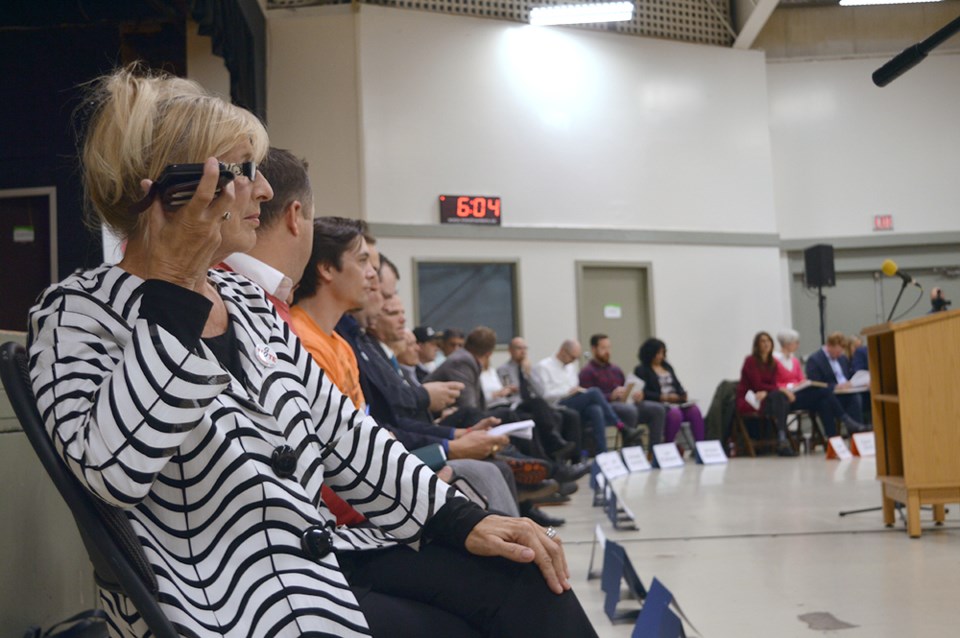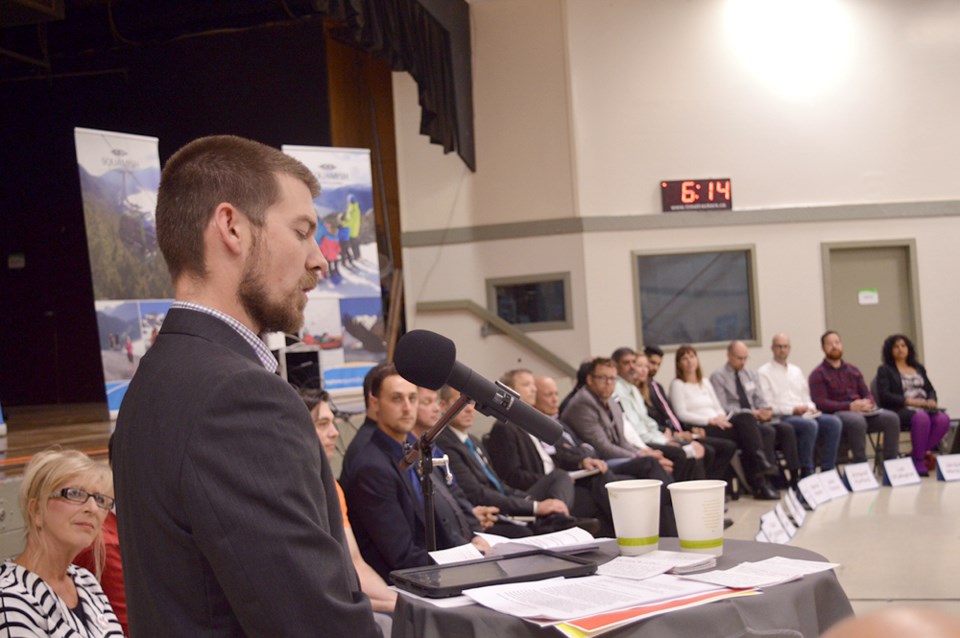There was the slightest bit of an edge when mayoral hopefuls addressed the usual Squamish concerns at the final all-candidates meeting, which was held Monday.
The tone of the forum was rather subdued, but there were a few moments when candidates took jabs at each other amidst an audience of hundreds that packed Brennan Park Recreation Centre’s gymnasium until it was standing room only.
“Do you stand with Susan, are you with Karen, or are you 100 per cent for Squamish?” said mayoral candidate Jeff Cooke, to a very audible reaction in the crowd.
“We need to get rid of this idea that we have to be on one team or the another. Either with Susan, or we’re with Karen, or we’re with Paul.”
Mayoral candidate Karen Elliott appeared to take issue with some of Susan Chapelle’s assertions that she was behind a number of District initiatives, such as getting buses to students on time.
“I think what Susan forgot to mention, is that it always takes four people to pass any motions on council,” said Elliott.

Aside from those remarks, however, candidates tackled the usual challenges facing town with their proposed solutions.
Chapelle and Elliott, both sitting councillors, brandished their experience at municipal hall as a selling point for a job promotion to the mayor’s seat.
Elliott cast herself as a mediator, saying that her work as a consultant enabled her to broker deals in hostile environments.
She advocated the creation of more low-cost campgrounds as a method of providing tourists a place to stay without infringing on residents’ space.
“Lots of people are coming here and they feel they can camp anywhere,” said Elliott. “I think it’s really important that we not push against that flow but accept that it’s coming and invest more in low-cost campgrounds.”
She reiterated her support of the highly-contested Garibaldi Springs project, saying that it would leave a legacy for the Squamish.
Elliott also noted that Squamish should work for both “eight and 80-year-olds” and advocated for better accessibility.

Chapelle played up her background as a business owner in the heart of Squamish downtown.
She said that there was too little space for businesses, leaving very limited choices for anyone wanting to build a workspace.
“You can talk about inviting people to town and inviting industry to town,” said Chapelle. “If you don’t have anywhere for them to work, it’s impossible to open a business here.”
Chapelle expressed concern at the idea that much land has been rezoned as residential, which, in addition to stifling business, could also leave the town vulnerable if the real estate economy took a turn for the worse.
“We can’t build our way out of a housing crisis — as more people come, we will never have enough housing,” she said.

Cooke, on the other hand, cast himself as a fresh set of eyes, advertising his lack of political experience as a major plus for the mayorship.
One of his main talking points with respect to addressing housing affordability issues was the creation of a $1,000 incentive to turn property owners using Airbnb into landlords for local renters.
“How do we not pay for it?” said Cooke, when asked how to pay for the incentive.
“Is it not cheaper to do this than to build an entire new building? So in my mind, it can come from community amenity contributions or whatever pot is created to create affordable housing, because this is exactly what this is doing — creating affordable housing for people.”
There are an estimated 364 active Airbnb rentals in town, according to airdna.co.
He also advocated for the creation of rent-controlled dorm-style housing for 200 people that could be used to provide residence to seasonal workers and struggling locals.
Cooke also expressed support for the highly-debated proposed Polygon seniors home development.

One of Paul Lalli’s distinguishing points was that he was the only mayoral candidate to promise a very specific amenity — free swimming lessons for those in kindergarten to Grade 2.
Lalli was also adamant on growing the economy and job creation.
He also used his prior council experience as a draw, implying that he had a hand in bringing a number of projects to fruition, such as the Valleycliffe fire hall, Quest University, and the Squamish Public Library, among other things.
“I’ve helped shape this community into what it is today,” he said.
He advocated for the creation of an economic committee in order to help guide policy — something which is already being implemented by the District.
Though he didn’t name the development, Lalli also appeared to express support behind Garibaldi at Squamish.
“I believe our biggest opportunity from a tourism perspective is the opportunity with a four-season resort,” said Lalli.

Aspiring councillors also had their turn to speak. Due to the sheer number of candidates, however, they were afforded much less individual time in the spotlight.
Eric Andersen said the District needed to bargain better with developers in order to benefit from development. He advocated for mental health services, more “discipline” with the municipal budget and for a heritage strategy to preserve the town’s character.
Edward Archibald said better facilities were needed, noting that buildings like Brennan Park were built when the town’s population was half its current size. He called for more art spaces and sold his experience as a developer as an asset in navigating a rapidly-developing town.
Philip Audet called for better regional transit and said he liked the idea of having a system in place by 2019. He said Squamish should be for everyone, new and old, and that affordable housing was a priority.
Ron Bahm said he would support the Squamish Farmers Market and said the town needed a user-paid sanitary dumping station.
Paul Dosanjh said he wanted a community that would be affordable for his children, and said the District needs to woo recreation and tech companies here to stimulate the economy.
Sacha Fabry said all issues, such as affordability, economic growth, and small businesses were linked and should be addressed together. He highlighted his fluency in French, saying he had the ability to lobby the federal government.
John French said bringing industry to town could provide more tax revenue, which could translate to reduced property taxes for residents. French also addressed questions about his prior work with Woodfibre LNG. He said he no longer has any ties to the company and, should the company’s affairs be part of council decisions, he would vote on the matter.
Stephen Fryer voiced his opposition to the proposed Garibaldi at Squamish development and noted that while he wasn’t familiar with the community amenity contribution policy, it should be re-examined.
Alanna Gillis emphasized community, sustainability and livability.
Rajan Hans supported a collaborative approach of bringing in the province and federal government to help address local housing affordability. He said his young age would help bring diversity to council, as well as a voice for the future generation.
Armand Hurford was adamant about sticking to the Official Community Plan as a way to manage development. He said he would only amend the document in few circumstances. He also added that affordable housing and transit were key to supporting local business.
Kevin Jewell was open to changing the date of the GranFondo, a sporting event often begrudged among those in town because of highway closures. Jewell also advocated for better transit that would make it more attractive to leave cars at home.
Janice MacLean wanted to give arts and culture the same priority as outdoor recreation. She said cultivating a cultural hub would foster a better sense of community.
Rick McKinney noted how his work at Squamish Helping Hands gives him an understanding of housing affordability challenges. He advocated for smaller lot sizes and “missing middle” homes that would help renters become owners.
Jacquie Menezes said she would advocate for tourism, but keep it out of sensitive ecological areas. She said transit, affordable housing and development were key issues in town.
Lee O’Callaghan also urged development to stay within the OCP boundaries and avoiding sprawl. He was in favour of covered bike parking and more bike lanes.
Bianca Peters called the town’s current growth overwhelming and uncontrolled. She said she would collaborate with small business to fill the void left by Greyhound’s service closures and floated the idea of Squamish becoming a regional stop for air travel.
Chris Pettingill was unconvinced that adding more supply to the housing market would fix affordability problems. He said the demand is so high that adding more housing alone wouldn’t solve the problem — instead, purpose-built rental is necessary. He also said he wasn’t against Airbnb because it has become necessary for new homeowners to make ends meet.

Doug Race, a sitting councillor, trumpeted his decade of experience in municipal hall. He said upholding the growth management boundaries in the OCP is necessary and said that some Airbnb restrictions are much needed.
Jenna Stoner voiced her opposition to the Garibaldi at Squamish development, saying there were financial liabilities associated with the project. She also said there were many things that needed to be taken as a priority, with affordable housing and the economy being among them.
Mike Young touted affordability, regional transit and economic development as priorities. He addressed a question about whether his occupation as a member of a property management group would be a conflict of interest, as much development zoning is decided by council. Young said he would recuse himself if he believed he was in conflict.
Terrill Patterson was not present at the forum.
The Squamish Chief, Tourism Squamish, The Squamish Arts Council, and the Squamish Chamber of Commerce hosted the event. The evening was moderated by Quest University professor Doug Munroe.



